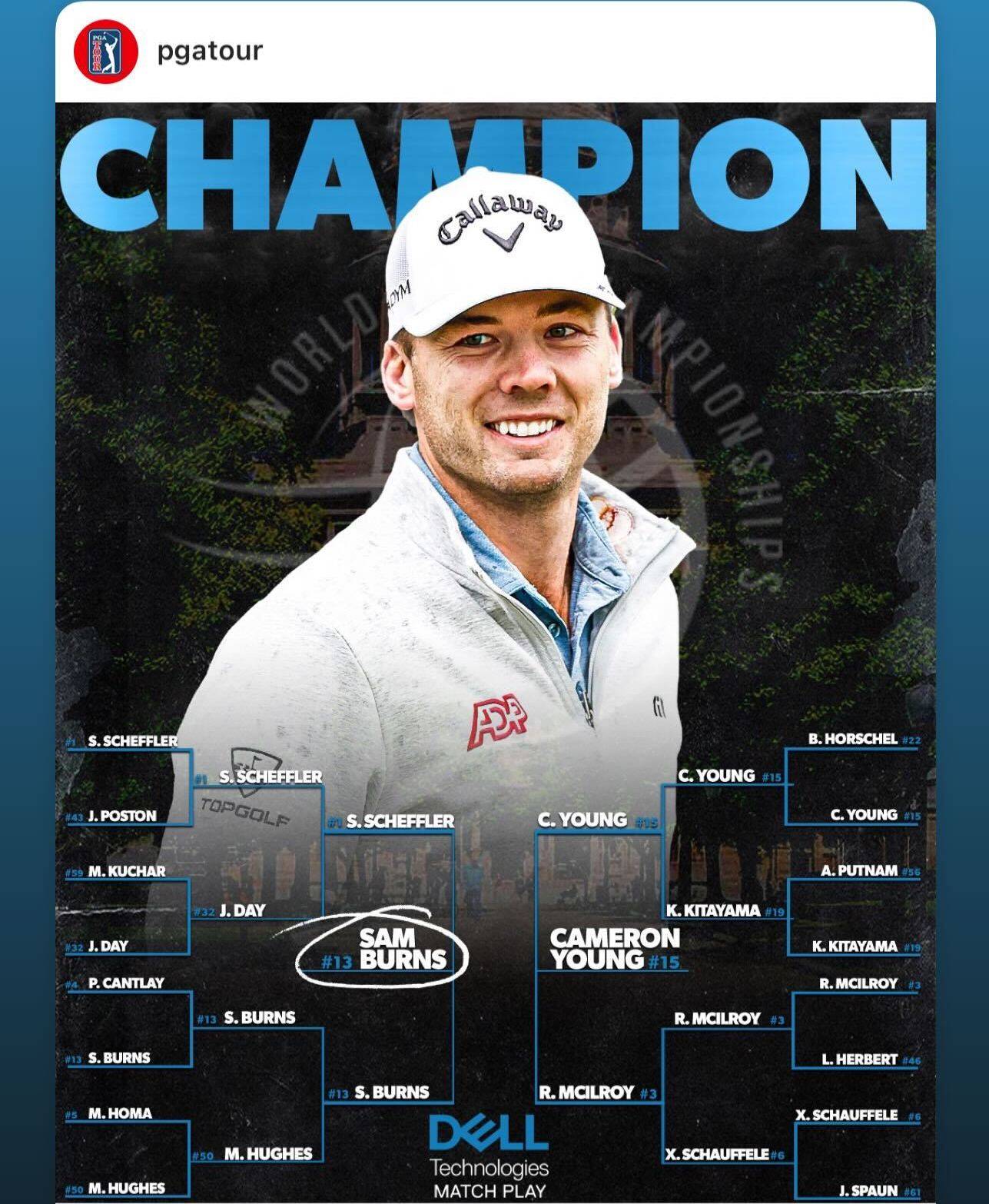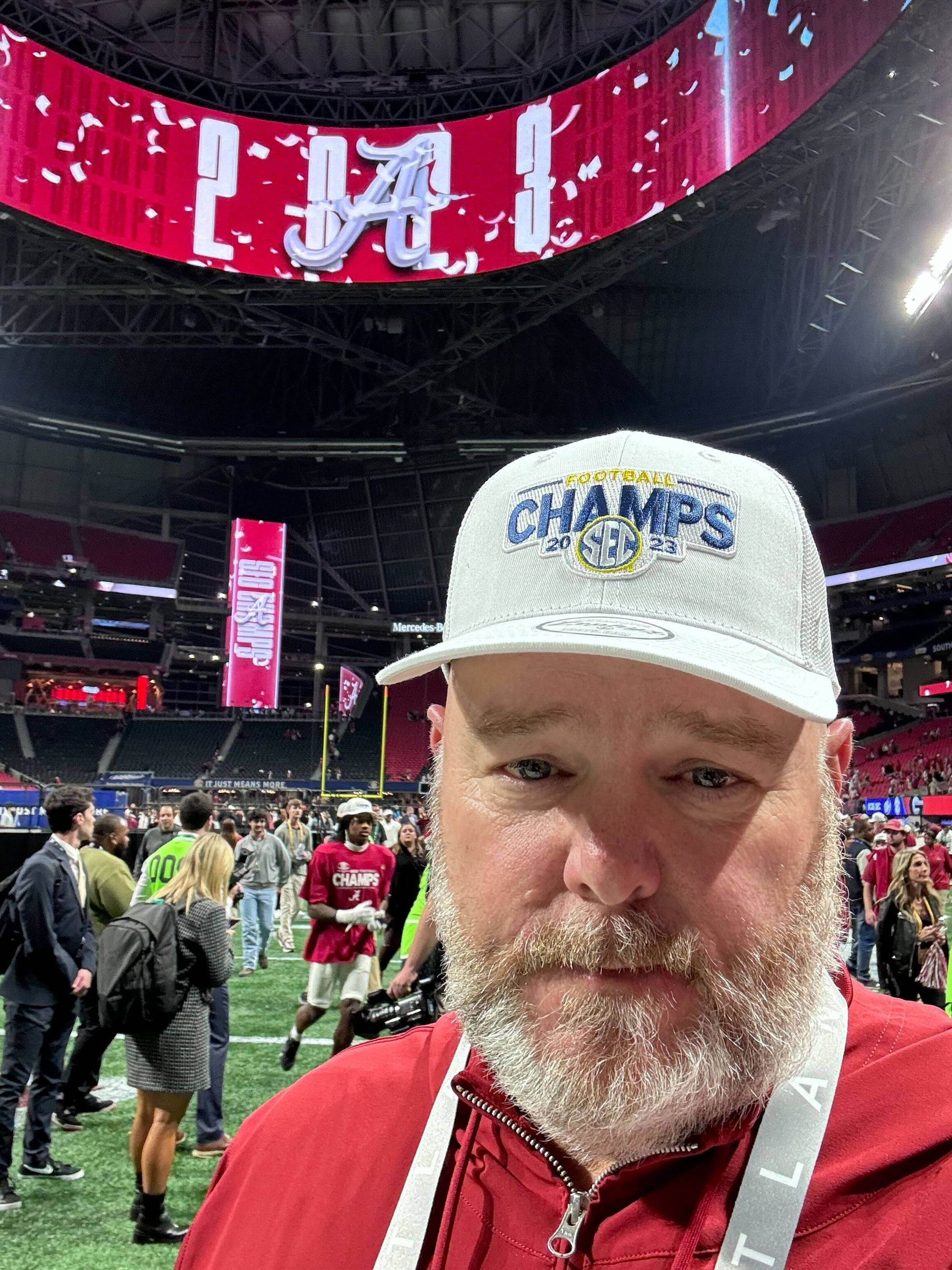
Bhrett McCabe
10 Lessons Learned from 2023
I stood on the sidelines at the Rose Bowl and listened to the iconic song Dixieland Delight with pride, joy, and a bit of trepidation. As the crowd sang each word of the impassioned battle cry of the University of Alabama football team, I watched two great teams compete on the greatest stage in college football – the Rose Bowl.
While our season did not finish the way we wanted it to, I could not be more proud of our team and coaching staff’s impact this season. We ended with a Southeastern Conference (SEC) championship and played in the playoffs. After the game, there were tears, hugs, and reflections of what could have been. I am sure pundits and armchair quarterbacks had the answers back at home, but after having been around this program this season, I am confident in our team, staff, and players.
At the end of every season, it is important to reflect on learnings from the past year. The University of Alabama is just one client that I am fortunate to work with who competes on the biggest stage. Between the PGA Tour, Major League Baseball, and other college programs, I get exposed to the “best of the best” on a daily basis. I wanted to reflect on my learnings from the 2023 year now that the calendar year has come on a close. The PGA Tour is starting up again this week, baseball is just around the corner, and our winter sports are in full swing, so here are my thoughts that may help you in your coach in your sport more effectively (next week, I will release how YOU can compete as a competitor better):
"The best in the world believe in what they have inside and have learned how to build their belief, develop it, and access it when they need it."
1. Coach PEOPLE First, Players Second
Your team is full of individuals who each bring their own beliefs, doubts, fears, and insecurities to the organization. They have desires and stresses that are unique them. Each player and contributor have their goals and whether they will admit or not to you, those goals drive their effort and commitment to the organization. In today’s world of the transfer portal, a new rival golf league, and free agency in professional sports, you must connect to the player as a person more than ever. If they do not feel that connection, they will seek that connection elsewhere.
Players have more voices in their heads than ever before. Private coaches, trainers, and advisors communicate regularly with their players and as a coach, you must build trust with your player.
You must connect to your player as a PERSON first, player second. You need to get to know them, understand them, and learn to see the world through their eyes. In today’s competitive landscape, TRUST is the currency of coaching, and this will even more important in 2024. If a player does not have a personal relationship with you, they will never trust you. If they do not trust you, you cannot coach them. Players who do not have a relationship with their coaches will build barriers psychologically and resist your influence.
Support first, coach second.
Meet with your players individually in 2024 more frequently and have regular conversations with them. I cannot tell you the number of times a player has told me about a meeting with their coach when they have had an adult conversation. It impacts the players deeply. You do not need to cross any boundaries but simply talking about cultural factors, shows you enjoy watching, and your favorite music can start a bound between two humans that can facilitate a powerful coaching relationship.
2. Lead Through The Valleys, Critique At The Summits
Since you coach PEOPLE first, you must be prepared to guide them through challenging times more often than periods of success. I find coaches often get more critical during struggle and this creates increased frustration, confusion, and resistance among players. Instead, I recommend you support during struggle.
When players or teams are struggling, they need support and guidance, not critical appraisals as to why they are struggling. Save that for later, despite your competitive emotions telling you to get the message across in that moment. Critical messaging only confuses an already chaotic moment.
Do not fear struggles, slumps, or frustrations as a coach. This is what you are built for. Instead, prepare for those moments and guide your organization through the difficult moments with clarity and confident direction.
When your team is succeeding, you can be more critical. Your team will be more willing to listen and will be riding confidence, covering up the insecurities that drive all competitors.
3. Build Belief In Your Players Through Your Coaching
I get asked all the time about the differences between the best players in the world and everyone else. The answer is much simpler than you think – it comes down to Self-Belief. The best in the world believe in what they have inside and have learned how to build their belief, develop it, and access it when they need it.
But that is difficult to do alone. Self-Belief can be an elusive target for competitors (anyone really). We are all filled with doubts and insecurities and our minds are conditioned to see gaps instead of strengths. No one enters a competition without fears, doubts, and insecurities, but the best in the world pivot their minds to rely on their beliefs, flooding those fears with evidence, and crushing insecurity with trusted plans to embrace chaos.
As a coach, invest in your players’ beliefs and help them see what they are capable of doing when it gets difficult. I am sure as a player, you remember that you figured things out on your own. I am sure your coaches were challenging you daily and you found a way to believe in yourself. Gasoline also used to be 25 cents/gallon and kids used to ride their bikes to school. This does not mean that your athletes of today are weaker. Quite the opposite in fact.
Athletes have more going on than ever before, more competition, and greater comparisons on social media. Their confidence and belief are under attack constantly, and many times, the bravado you see is a front. The “arrogance” is nothing more than a veil covering their fears and doubts.
Meet with them and share with them what they do well. Ask yourself what you want them to rely on when the competition gets difficult – their beliefs or their insecurities. Coach from that answer.
4. Show Your Players Your Vision For Their Future
Speaking of Self-Belief, it is essential you share your vision for your players and team. You are a guide, a leader, and a developer. If you do not show them what you see for their future, where do you think they will find that answer?
I often hear from players that they are unsure of where they stand with their coach. They want your approval and they want your belief. I have found that today’s competitor has two major insecurities: Am I good Enough and Does my Coach Believe/Like me? Think about that.
Coaches often tell me they are cautious to be honest with a player because if they tell them the truth, they fear they may lose the player’s trust. Ambiguity destroys trust much faster than honesty does. The most critical factor, however, is being honest about their developmental plan, areas of improvement, and how you will help them achieve your vision. Do not leave to fend for themselves, but be honest about what you want to see, how you will measure it, and the factors they can do to improve.
I have not been around many players who have a clear plan and fail to do it. Most players fail to grow because they do not believe in their plan, do not know what to do, or lose trust in how they are being evaluated.
I would recommend a Player Developmental Plan for each player on your team and in your organization. Review it regularly and keep a copy of the notes of your meetings.
5. The Basics Remain The Greatest Secret To Success
The hardest thing to do in competition is to trust the simple details. In competition, the mental chaos intensifies with such intensity that the mind attempts to grasp the most complicated algorithms instead of simple plans.
If you have ever been lost and had people in your car shouting directions at you, you understand this phenomenon. It is funny how simple directions can get so convoluted in such short order.
Those who do not focus on the details miss the easiest pathway to success. I call it the Hamburger Test.
When I travel, I often search out local restaurants to sample the homegrown cuisine of the region. I always look for the hamburger on the menu for one simple reason – it may be the easiest item on the menu. I am talking traditional cuisine, not sushi or other fancy restaurants for this example.
If the restaurant has a hamburger on the menu, I ask the bartender about it. If they say, it’s “ok,” it makes me question the other options on the menu. If they say, “it is the best,” then I will order it. Why would I go to a local restaurant and order a hamburger? Details.
If the restaurant “mails it in” on the burger, why would I trust that their specials are any better? Think about it – a burger is not difficult in theory, but great burgers require a commitment to the details. It is easy to pass off a frozen patty as a serviceable burger, but great hamburgers are epic when they are creative, simple, and delivered so well.
Are you mailing it in and assuming the details will take care of themselves?
How does your locker room, office, or car look? Dirty and cluttered or organized and clean?
Do you have practice plans posted for your players, meeting agendas circulated prior to meetings (at least 24 hours for effective meetings), and does your competitive arena reflect that level of preparation or is it dirty? Remember, your opponent or competition will be looking for any opening and if they see a lack of attention to detail, they will find a way to exploit it.
The details are simple if you take the time to invest in them. You have to just focus on them.
6. Encourage Your Coaching Staff’s Voices To Sing In Harmony, Not In Unison
One of the greatest business books ever written is Good to Great by Jim Collins. There are so many powerful lessons in that book that I encourage all leaders to read it annually.
In my opinion, the greatest lesson in that book is that great leaders have better talent on their teams than themselves. Great leaders encourage their team members to surpass them, to share their expertise, and do not feel threatened by them. As a leader and coach, recruit better talent than you and encourage them to use all of their talent in your system.
The most important thing is to encourage each of the members of your team to share their unique voices, aligned with your vision and system, and to complement the other voices on your staff. The goal is not to make each of them repeat the same message, but to bring their unique way to share the message to the players.
If your coaches are better than you, it will benefit you if you give them the platform to share their expertise. If you find yourself feeing threatened, ask yourself who that is benefitting? In the end, it will limit your growth.
7. Allow Players The Right To Improve
This year on tour, two players who I had worked with the past won Majors – Wyndham Clark and Brian Harman. I am so proud of them and their accomplishments. They both have improved so much over the years and there is a reason they won. It was not an accident.
Why do coaches fall into the trap of taking a snapshot of a player and making predictions of the future on them? JJ Watt was a walk-on in college football. First pick in the Major League Baseball draft, Paul Skenes, started out at the Air Force Academy. While an amazing school and developmental environment, the Academy is not known for producing Major League Baseball talent.
Sometimes, players find something and it propels them. Many times, that “something” opens up their belief and new summits come into view, supported by better engagement with their systems to drive success.
If you have a Player Development Plan for your players, why does this season’s evaluation have to be the prediction for two years from now?
8. Remember, When IT Hits The Fan, You Are Prepared For It
I want my pilots to fly better in turbulence than good weather. As a coach, you are better equipped to handle struggle than success. The problem is that coaches often lack their own self-belief to lead through challenges.
Losing streaks lead to so many evaluations within a system. Unfortunately, coaches lose their emotional discipline during struggle just like players do, and lose focus on the details, systems, and contributors who can drive through the struggle.
As a coach, you are built for struggle and the hard days that lie ahead of you. Be careful to not chase comfort, calm, and predictability around you and try to reconnect to your emotions, vision, and systems in struggle. I remember a coach telling me a few years ago that during one of the hardest times in her career, she started to slow down your speech to her team, sat with more “presence” at her desk, and limited the amount of time she spoke to her team. She wanted her team to not chase fixes and start to trust that they would be just fine in the struggle. She had to model that behavior and over time, her team started to slow down without her having to overcoach them.
9. Why Do YOU Coach?
Last year on Tour, I wanted to find those coaches who had spent the most years on Tour and pick their minds. I have been fortunate to sit with legends in the game and listen to amazing stories over the past three decades.
There was one consistent theme that they all shared – they loved to coach and all seemed to study other coaches with the passion of a young coach. One legend shared with me that he felt that he was winding down his career and would remind himself every day that he showed up to the course that the day was an opportunity to be with his player and not a stress.
Coaching and leadership can be brutal journeys, destroying the ego and systems around the best of the best. If you lose your North Star, you lose your directional focus.
Remember to see each day as an opportunity to serve those on your team, to become a part of their dreams and journeys, and become a catalyst for them to reach their dreams.
Ask yourself this question – if you were showing up on the first day of work, would you be excited?
I forget that myself.
10. Do They Believe You Are The Advantage?
As a leader and coach, does your team see that you are a competitive advantage?
In every competition, there are a series of inflection points that can change the outcome in an instant. As a coach, does your team believe that you will be ready to face those challenges?
Coaches may not be able to intervene in the distinct competitive moment that a game is decided, but they can prepare the players, identify the threats, and ready for the opportunities that decide the outcome of the game.
When I was playing for LSU Baseball, we were preparing to play the University of Southern California (USC) in our regional finals, and the winner would be advancing to the College World Series. USC was loaded with talent and so were we, so the game was going to be a battle between two quality teams. They had to beat us twice in our home stadium and the crowd would be decidedly in our favor.
As pregame warmups ended, Coach Bertman, our famed coach who would go on to win five national titles and end his career with a perfect 28-0 record in championship games (conference, regional, and national title championship games when it was lose or go home), walked into our huddle and delivered the best message ever:
“Guys, they are really good. So are we. The game is going to come down to who is going to be ready in the deciding moments of this game. But guys, you are ready, prepared, most importantly, USC does not have ME in their dugout. I have you and you are ready.”
WOW!
What a message. We went on to beat USC and advance to the College World Series. He was right. He had us prepared and he made some decisions in that game that led us to victory. That is why is the best to ever coach college baseball.
Do you see yourself as a difference maker as a coach and leader? Be careful to not perceive that question as pushing unfounded arrogance but rather, belief in your ability to prepare your organization for the challenges that lie ahead. Your team will reflect your level of confidence in yourself and your team.
Looking Ahead to 2024
The lessons that I learned in 2023 were incredible. I watched players find their voice, overcome adversity, win championships, and become new and improved versions of themselves. More importantly, I witnessed the transformation of coaches to meet the demands of the “2023 athlete,” connecting to the individual and adapting their systems to the player to maximize the impact.
I found myself in the corners of convention hallways listening to years of coaching wisdom and trying to absorb everything I could. In 2023, I learned to find my voice as well, learning to say what I needed to say and not hold back. Unfortunately, I experienced that lesson the hard way, losing the connection with a client, but in doing so, I found myself again.
If you are a coach or leader of an organization and want to maximize your impact, give me a shout as we have many options to help you take 2024 to all new heights.
I look forward to hearing from you







